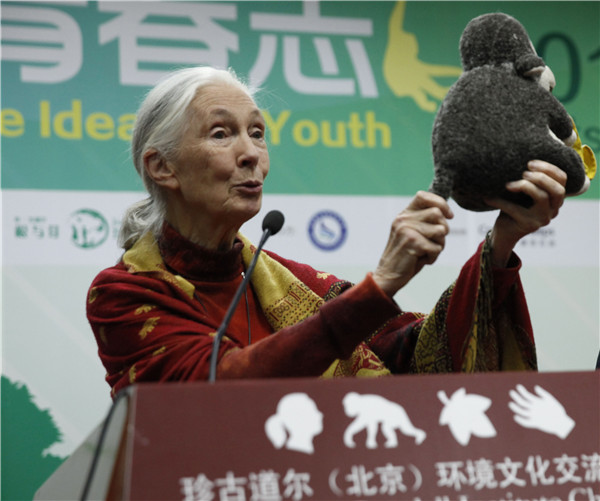Our brains can save us
 |
|
Primatologist and environmentalist Jane Goodall speaks at the recent Beijing summit of the Roots & Shoots environmental-education program for youth run by her institute. [Photo provided to China Daily] |
What started as a mission to save the chimpanzees turned into a journey to improve life for all living things.
Roots & Shoots, an environmental-education program for youth run by the Jane Goodall Institute, has 150,000 members in 130 countries and regions, and 700 groups on the Chinese mainland.
"My hope for Roots & Shoots is to create a critical mass of young people who understand the importance of the natural world-for humans as well as wildlife-and a group of people who understand that-while we need money to live-it starts to go wrong when we live for money," she tells China Daily in Beijing.
"But it's really young people who understand that economic development at the expense of the environment is a death knell if it goes on like this for the children of the future. That's worldwide."
Goodall says she has seen vast changes in Chinese children's mentality since she started coming to the country three decades ago. Adults are following suit.
"China is already beginning to do a lot. In some cases, it's a world leader in things like solar technology," Goodall says.
"The big problem in China is air pollution."
She says China has done better than many countries on climate change, especially regarding the Paris Agreement that China signed.
But the world needs more, she believes.
"Some countries are really doing well. And other countries have signed it and are carrying on as usual or even worse-that's not China."
She's impressed by a water-purification system in Sichuan province's capital, Chengdu, that uses gravity to pull water through marshland plants that filter out contaminants. It doubles as a fish habitat.
Wetlands as sieves proved a prominent theme among students' displays at the Beijing Roots & Shoots summit. Six primary schools in Jiangsu province's Zhangjiagang distributed hand-drawn postcards of wetlands with handwritten descriptions of what they learned during field research.
Dalian Minzu University student Wang Shuaiyu called the event and meeting Goodall "very moving".
"It's a moment to celebrate all our environmental-protection projects," she says.
Goodall told the crowd one of her sources of hope is "our extraordinary brains".
"It's the explosive development of the human intellect that is the single greatest difference between us and chimpanzees, our closest animal relatives-and all other animals," she says.
Beijing's air pollution reminds her of London when she was growing up.
"It was same in New York and LA. It was when people began to use brains that we gradually made the difference."
That, she believes, is still happening worldwide.
"You," she told the Beijing crowd, "are my reason for hope."
Contact the writer at erik_nilsson@chinadaily.com.cn
China Daily explores the country's shades of green in this series.
















